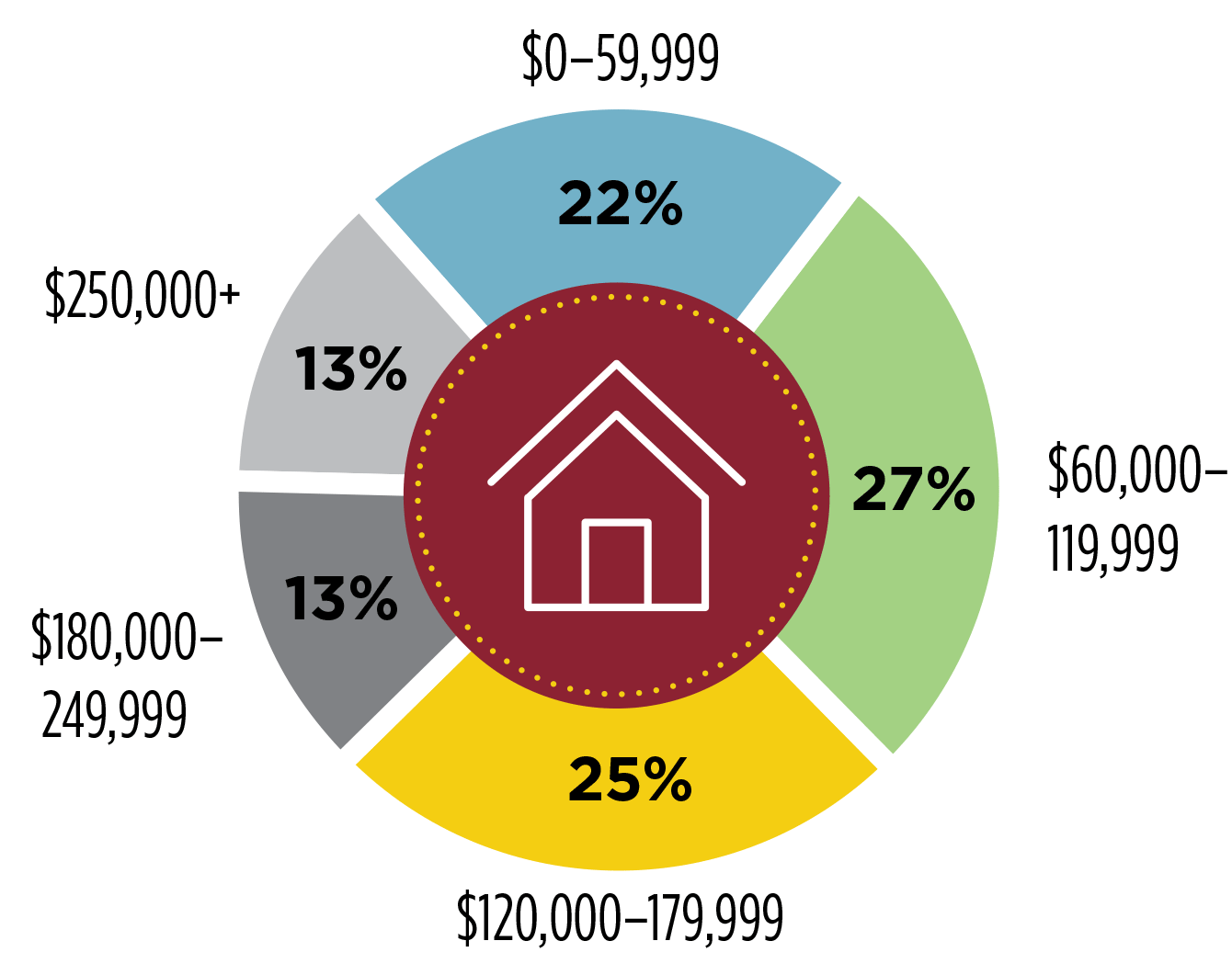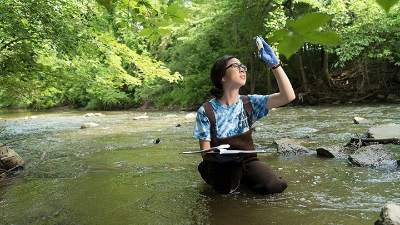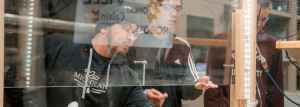/ Academics / Departments & Programs / Engineering / Academics / Mechatronics
Mechatronics
concentration
Degree Overview
Build and create in a fast-growing field.
Robotics and automation are transforming countless industries, from manufacturing to artificial intelligence to telecommunications. Whether it's self-driving cars or industrial robots, there's an unprecedented need for engineers who can imagine and build creative, efficient systems that use cutting-edge tech and thinking to solve age-old human needs.
In Calvin's mechatronics program, you'll gain skills and experience to lead in one of the fastest-growing fields in engineering. Your classes will ground you in engineering fundamentals that you can leverage in any career, while giving you practical experience with machine design, electronic controls, and computer programming.
When you integrate this technical expertise with Calvin's unique emphasis on the liberal arts, you'll graduate with everything you need to take a leadership role in a wide range of careers.
Program Distinctives




Take the next step:
Degree Information
concentration
-
Overview
The mechatronics engineering concentration option within the engineering program provides depth in the areas of mechanical system analysis and design, as well as digital and analog electronics expertise. This interdisciplinary curriculum will equip students for professional work on projects that span the intersection of mechanical and electrical engineering domains (e.g., automation systems, robotics, and electromechanical engineering).
-
Courses
Program Requirements
General Engineering Courses
(26 semester hours)
ENGR 101 - Introduction to Engineering Design
ENGR 202 - Statics and Dynamics
ENGR 204 - Circuits Analysis and Electronics
ENGR 205 - Principles of Materials Science
ENGR 209 - Introduction to Conservation Laws and Fluid Mechanics
ENGR 294 - Engineering Seminar
ENGR 295 - Internship Workshop
ENGR 339 - Senior Design Project
ENGR 340 - Senior Design Project
ENGR 394 - Engineering Seminar
Cognates
(38 semester hours minimum. Some courses may fulfill Core requirements.)
BUS 357 - Business for Engineers
OR ACCT 203 - Managerial Accounting AND BUS 201 - Management and Organizational Behavior
CHEM 101 - General Chemistry I
OR CHEM 103 - Accelerated General Chemistry
IDIS 102 - Oral Rhetoric for Engineers
OR COMM 101 - Oral Rhetoric
MATH 171 - Calculus I
MATH 172 - Calculus II
MATH 231 - Differential Equations with Linear Algebra
MATH 271 - Multivariable Calculus
PHYS 133 - Introductory Physics: Mechanics and Gravity
PHYS 235 - Introductory Physics: Electricity and Magnetism
Take One from the Following
CS 104 - Applied Computing
CS 106 - Introduction to Scientific Computation and Modeling
CS 108 - Introduction to Computing
Take One from the Following
ECON 191 - Introduction to Economics
ECON 221 - Principles of Microeconomics
ECON 222 - Principles of Macroeconomics
ECON 232 - Environmental Economics
ECON 233 - Economics of Energy and Sustainability
Take One from the Following
(STAT 341, STAT 343, and STAT 344 may also count as advanced mathematics electives.)
STAT 143 - Introduction to Probability and Statistics
STAT 145 - Biostatistics
STAT 241 - Engineering Statistics
STAT 243 - Statistics
STAT 341 - Computational Bayesian Statistics
STAT 343 - Probability and Statistics
STAT 344 - Mathematical Statistics
Mechatronics Engineering Concentration Requirements
(40 semester hours minimum)
ENGR 304 - Fundamentals of Digital Systems
ENGR 305 - Mechanics of Materials
ENGR 307 - Electrical Signals and Systems
ENGR 311 - Electronic Devices and Circuits
ENGR 315 - Control Systems
OR ENGR 342 - Process Dynamics, Modeling, and Control
ENGR 322 - Machine Design with Finite Element Analysis
ENGR 324 - Materials and Processes in Manufacturing
OR ENGR 332 - Analog Circuits and Systems Design
ENGR 334 - Dynamics of Machinery and Instrumentation
ENGR 350 - Special Topics in Engineering
Take 6 Hours from the Following
At Least 2 Hours of Advanced Math or Basic Science Electives
ASTR 211 - Planetary and Stellar Astronomy
ASTR 212 - Galactic Astronomy and Cosmology
BIOL 141 - Cell Biology and Genetics for the Health Sciences
BIOL 160 - Ecological and Evolutionary Systems
BIOL 161 - Cellular and Genetic Systems
BIOL 205 - Human Anatomy
BIOL 206 - Human Physiology
BIOL 207 - Medical Microbiology
BIOL 231 - Introduction to Animal Physiology
BIOL 364 - Global Health, Environment, and Sustainability
BIOL 372 - Dutch Sustainability: Is Orange the New Green?
CHEM 102 - General Chemistry II
CHEM 210 - Analytical Chemistry
CHEM 230 - Essential Inorganic Chemistry
CHEM 240 - Survey of Organic Chemistry
CHEM 241 - Organic Chemistry I
GEO 120 - Earth Systems
GEO 151 - Introduction to Geology
GEO 152 - Historical Geology
GEO 215 - Mineralogy
GEO 252 - Geomorphology
GEO 325 - Hydrogeology
KIN 212 - Anatomical Kinesiology
KIN 213 - Biomechanics
MATH 305 - The Geometry and Topology of Manifolds
MATH 312 - Logic, Computability, and Complexity
MATH 331 - Nonlinear Dynamics and Chaos
MATH 333 - Partial Differential Equations
MATH 335 - Numerical Analysis
MATH 355 - Advanced Linear Algebra
MATH 361 - Real Analysis I
MATH 362 - Real Analysis II
MATH 365 - Complex Variables with Topics
PHYS 131 - Matter, Light, and Energy
PHYS 246 - Waves, Optics, and Optical Technology
PHYS 306 - Introduction to Quantum Physics
PHYS 335 - Classical Mechanics
PHYS 345 - Electromagnetism
PHYS 346 - Advanced Optics
PHYS 365 - Thermodynamics and Statistical Mechanics
PHYS 375 - Quantum Mechanics
STAT 341 - Computational Bayesian Statistics
STAT 343 - Probability and Statistics
STAT 344 - Mathematical Statistics
Take the Remaining Hours from Advanced Mathematics, Basic Science, Technical, or Engineering Electives
ASTR 211 - Planetary and Stellar Astronomy
ASTR 212 - Galactic Astronomy and Cosmology
BIOL 141 - Cell Biology and Genetics for the Health Sciences
BIOL 160 - Ecological and Evolutionary Systems
BIOL 161 - Cellular and Genetic Systems
BIOL 205 - Human Anatomy
BIOL 206 - Human Physiology
BIOL 207 - Medical Microbiology
BIOL 231 - Introduction to Animal Physiology
BIOL 364 - Global Health, Environment, and Sustainability
BIOL 372 - Dutch Sustainability: Is Orange the New Green?
CHEM 102 - General Chemistry II
CHEM 210 - Analytical Chemistry
CHEM 230 - Essential Inorganic Chemistry
CHEM 240 - Survey of Organic Chemistry
CHEM 241 - Organic Chemistry I
CS 112 - Introduction to Data Structures
CS 212 - Data Structures and Algorithms
CS 214 - Programming Language Concepts
CS 232 - Operating Systems and Networking
CS 300 - Special Topics in Computer Science
CS 326 - Embedded Systems and the Internet of Things
ENGR 220 - Introduction to Computer Architecture
ENGR 250 - Introduction to Biomedical Engineering
ENGR 302 - Engineering Electromagnetics
ENGR 303 - Chemical Engineering Principles and Thermodynamics
ENGR 306 - Principles of Environmental Engineering
ENGR 308 - Environmental Engineering Design
ENGR 312 - Chemical Engineering Thermodynamics
ENGR 314 - Vibration Analysis
ENGR 318 - Soil Mechanics and Foundation Design
ENGR 320 - Hydraulic Engineering
ENGR 321 - Hydraulic Engineering Design
ENGR 326 - Structural Analysis
ENGR 327 - Structural Design
ENGR 330 - Fluid Flow and Heat Transfer
ENGR 338 - Introduction to Traffic Engineering and Highway Design
ENGR 350 - Special Topics in Engineering
GEO 120 - Earth Systems
GEO 151 - Introduction to Geology
GEO 152 - Historical Geology
GEO 215 - Mineralogy
GEO 252 - Geomorphology
GEO 260 - GIS and Cartography
GEO 325 - Hydrogeology
KIN 212 - Anatomical Kinesiology
KIN 213 - Biomechanics
MATH 305 - The Geometry and Topology of Manifolds
MATH 312 - Logic, Computability, and Complexity
MATH 331 - Nonlinear Dynamics and Chaos
MATH 333 - Partial Differential Equations
MATH 335 - Numerical Analysis
MATH 355 - Advanced Linear Algebra
MATH 361 - Real Analysis I
MATH 362 - Real Analysis II
MATH 365 - Complex Variables with Topics
PHYS 131 - Matter, Light, and Energy
PHYS 246 - Waves, Optics, and Optical Technology
PHYS 306 - Introduction to Quantum Physics
PHYS 335 - Classical Mechanics
PHYS 345 - Electromagnetism
PHYS 346 - Advanced Optics
PHYS 365 - Thermodynamics and Statistical Mechanics
PHYS 375 - Quantum Mechanics
STAT 341 - Computational Bayesian Statistics
STAT 343 - Probability and Statistics
STAT 344 - Mathematical Statistics
Total Semester Hours: at least 127

Family income distribution for students applying for financial aid.
You can afford a Calvin education.
You’ve heard a lot about the high cost of a university education. But a Calvin education is much more affordable than you think. Most Calvin students pay far below the sticker price—and graduate with less debt than you might expect.

A reputation for excellence.
There’s a reason Calvin gets top marks from U.S. News & World Report, The Princeton Review, and more. Calvin graduates are in demand at grad schools, med schools, and careers in every field.

ACADEMIC OPTIONS
With over 100 majors and programs, you’re bound to find something you love.
Browse by category
- Arts
- Business
- Communication & Media Studies
- Education
Undergraduate education
- Early Childhood
- Elementary Grade Bands
- Art: Pre-K to 12th Grade
- French: Pre-K to 12th Grade
- Health & PE: Pre-K to 12th Grade
- Spanish: Pre-K to 12th Grade
- Special Education
- TESOL: Pre-K to 12th Grade
- Secondary Education
- English: 5th to 9th Grade
- Math: 5th to 9th Grade
- Science: 5th to 9th Grade
- Social Studies: 5th to 9th Grade
- English: 7th to 12th Grade
- Math: 7th to 12th Grade
- Science: 7th to 12th Grade
- Social Studies: 7th to 12th Grade
- Health Sciences
- Exercise Science
- Kinesiology (Pre-professional Emphasis)
- Nursing
- One Health
- Pre-Dentistry
- Pre-Medicine
- Pre-Occupational Therapy
- Pre-Optometry
- Pre-Pharmacy
- Pre-Physical Therapy
- Pre-Physician Assistant
- Pre-Podiatry
- Pre-Veterinary
- Public Health
- Recreation Leadership
- Speech Pathology and Audiology (BA, MA)
- Master of Speech Pathology
- Theraputic Recreation
- Humanities
- Ministry
- Science, Technology, Engineering & Mathematics
- Social Sciences
- World Languages & Cultural Studies

Apply to Calvin
It all starts here! We accept applications on a rolling basis throughout the year. All completed applications receive equal consideration.
Start your journey
Visit Calvin
Find the visit option that works best for you and get a taste for life at Calvin!
Browse Visit Options Launch the virtual tour
Request Info
Learn why Calvin’s dedication to faith and discovery have earned it the rank of #3 among regional Midwest universities.

Costs & Financial Aid
Families from all economic backgrounds—many just like yours—are making Calvin work. Scholarships, grants and loans are the tools that make Calvin possible.
Explore financial aid & Scholarships How much does Calvin cost?

